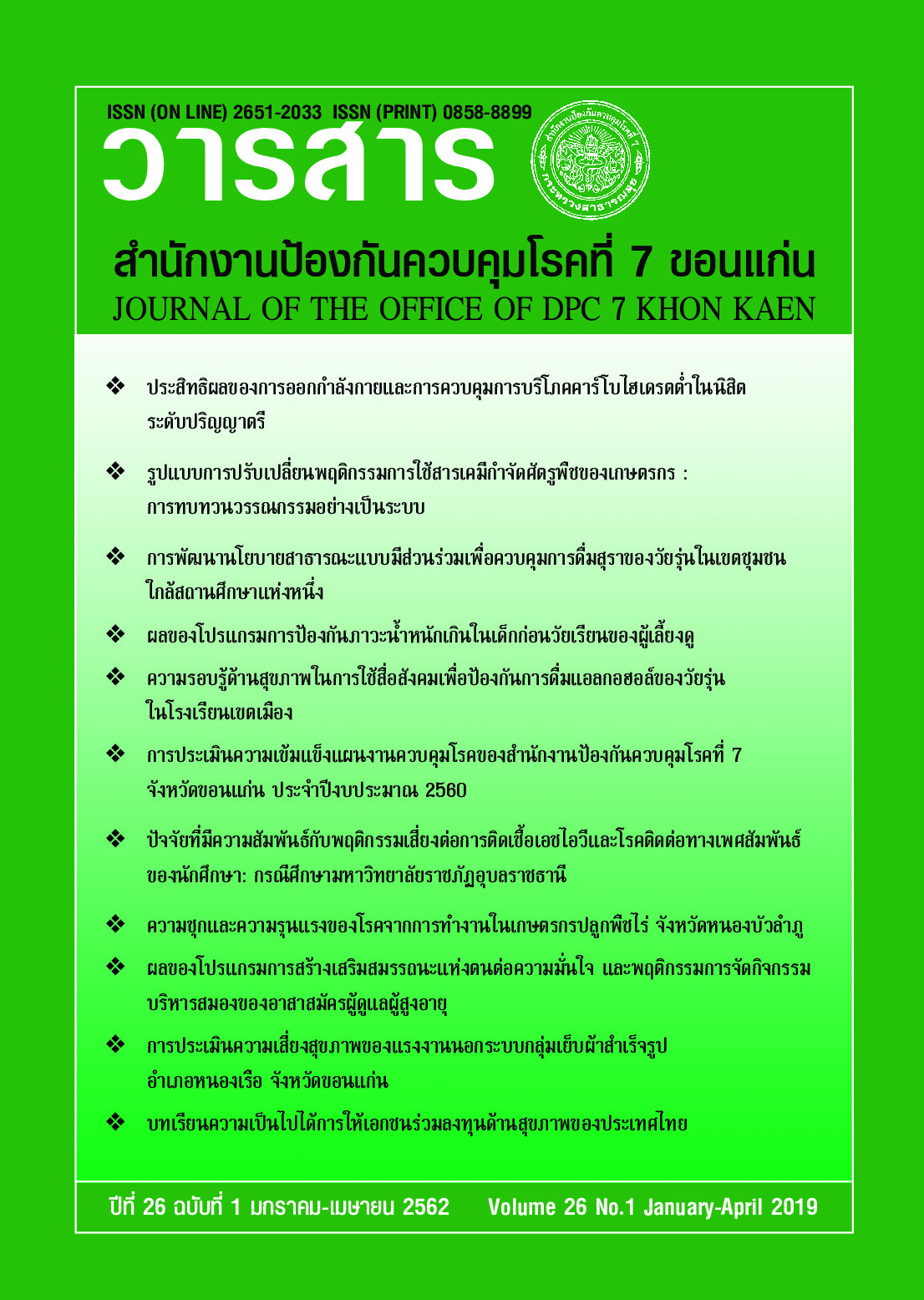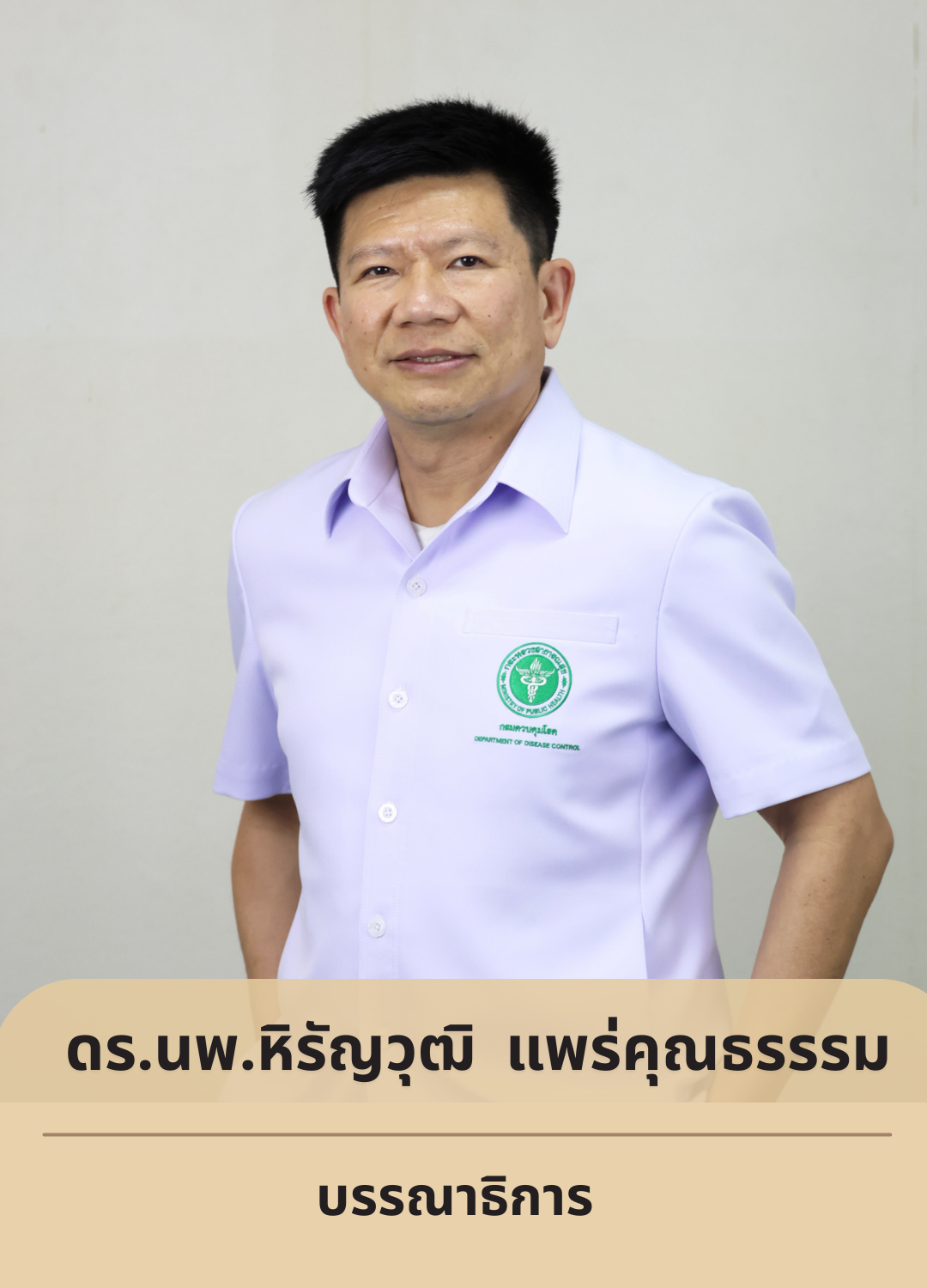ผลของโปรแกรมการสร้างเสริมสมรรถนะแห่งตนต่อความมั่นใจ และพฤติกรรมการจัดกิจกรรมบริหารสมองของอาสาสมัครผู้ดูแลผู้สูงอายุ
บทคัดย่อ
งานวิจัยนี้เป็นการศึกษาแบบกึ่งทดลอง เพื่อเปรียบเทียบความแตกต่างของความมั่นใจในการจัดกิจกรรมบริหารสมองก่อนและหลังได้รับโปรแกรมการสร้างเสริมสมรรถนะแห่งตน และผลของโปรแกรมนี้ต่อพฤติกรรมการจัดกิจกรรมบริหารสมอง กลุ่มตัวอย่างเป็นอาสาสมัครผู้ดูแลผู้สูงอายุที่ถูกเลือกแบบเฉพาะเจาะจง จำนวน 20 คน เครื่องมือที่ใช้ประกอบด้วย 1) แบบบันทึกข้อมูลทั่วไป 2) แบบวัดการรับรู้ความมั่นใจการจัดกิจกรรมบริหารสมอง และแบบประเมินทักษะพฤติกรรมการจัดกิจกรรมบริหารสมองที่มีค่าความเที่ยง เท่ากับ 0.88 และ 0.96ตามลำดับ และ 3) โปรแกรมสร้างเสริมสมรรถนะแห่งตนที่ประกอบด้วย 2 ระยะ คือ ระยะที่ 1 การให้ความรู้ และฝึกปฏิบัติกิจกรรมบริหารสมอง และ ระยะที่ 2 ฝึกปฏิบัติกิจกรรมบริหารสมองเป็นเวลา 5 สัปดาห์ โปรแกรมมีค่าความตรงตามเนื้อหาเท่ากับ 0.88. วิเคราะห์ข้อมูลโดยใช้สถิติเชิงพรรณนา Wilcoxon Sign-Rank test และ T-test ผลการวิจัยพบว่าอาสาสมัครผู้ดูแลผู้สูงอายุมีความมั่นใจการจัดกิจกรรมบริหารสมองหลังได้รับโปรแกรมสูงกว่าก่อนได้รับโปรแกรมอย่างมีนัยสำคัญทางสถิติ(Z -3.925, p< .001)และมีพฤติกรรมการจัดกิจกรรมบริหารสมอง หลังได้รับโปรแกรมสูงกว่าเกณฑ์ที่กำหนดอย่างมีนัยสำคัญทางสถิติ (t= 3.290, df= 19, p < .01)ดังนั้นโปรแกรมนี้มีผลต่อการเพิ่มความมั่นใจและความสามารถของอาสาสมัครผู้ดูแลผู้สูงอายุในการจัดกิจกรรมบริหารสมอง จึงควรพัฒนาเป็นหนึ่งในโปรแกรมเพื่อการอบรมอาสาสมัครผู้ดูแลผู้สูงอายุและควรมีการติดตามระดับการรู้คิดของผู้สูงอายุที่เข้าร่วมกิจกรรมบริหารสมองต่อไป
เอกสารอ้างอิง
2. The Office of Promotion and Protection of Children, Youth, Disabilities, the Elderly and Vulnerable Groups M of SD and HS. Guide Book for the Elderly Health care Volunteers. Bankkok: PG scan; 2004. (In Thai)
3. Ekachampaka P, Wattanamano N. Health status and health problem of Thai. In: Wibulpolprasert, Suwit, editors. Thai health profile 2008-2010. Bangkok: Printing Press, The War Veterans Organization of Thailand; 2011. page 147–61. (In Thai)
4. Woods B, Aguirre E, Ae S, Orrell M, Woods B, Aguirre E, et al. Cognitive stimulation to improve cognitive functioning in people with dementia ( Review ). Cochrane Database Syst Rev 2012; 2: 2-4.
5. Chattrawongwiwat T, Kong-in W, Thaniwattananon P. Impacts of a Memory-Enhancing Programme on Perceived Memory Self-Efficacy amongst Elderly People. Thai J Nurs Counc 2013; 28: 98–108.
6. Leethongin M, Piyawattanapong S, Sommongkol S, Thhiengtham S, Kumniyom N. Effects of Physical activity and brain exercise program on cognitive ability in elderly with healthy elderly people. Walailak J Sci Technol 2018; 15. Available from: https://wjst.wu.ac.th/index.php/wjst/article/view/3818. (In thai)
7. Mongkhonkhaha A. Factors that have correlation with Job Motivation of Local Health Cara Volunteers in Area Zone of Bab Ni Vet Municipality Sub-District, Tawatburi Distct,Roi-Et Province. (dissertation). Mahasarakham: Mahasarakham University; 2009. (In thai).
8. Eamsamai S, Mhuansit R, Thongmag C. An Elderly Care Model among Caregiving Volunteers at Phukrang Municipality, Amphur Praputthabat, Saraburi Province. Nurs J Minist Public Heal 2012; 22(3):77–87. (In thai)
9. Julnual T. Enhancement of Elderly Caregiver Volunteers’ Roles on Elderly Home Caregiving: A Case Study of Satun Social Development and Human Security Office.(dissertation). Bangkok: Thammasat University; 2011.(In thai)
10. Srivanichakorn S. Caring for the elderly Integrated in the community (Internet). Bangkok: TQP; 2012. Available from: https://www.thaiichr.org/upload/forum/ElderlyCare.pdf. (In thai)
11. Innets T, Powwattana A, Pichayapinyo P. Self-efficacy Enhancement with Participatory Learning of Health Volunteer for Promoting the Health Behavior of The Elderly with Hypertension. J Public Health (Bangkok) 2011; 41(1): 5–16. (In thai)
12. Prombutr P, Sookpool A, Phinyo K, Phinyo P. The Effect of Self-efficacy Program toward Knowledge and Self-efficacy of Village Health Volunteers in Diabetic and Hypertension Patient Care in Community in Northeast Province. Songklanagarind J Nurs 2015; 35(2): 113–28. (In thai)
13. Bandura A. Social foundations of thought and action: a social cognitive theory. Englewood Cliffs, NJ: Prentice-Hall.; 1986.
14. Watters AL, Stabulas-savage J, Toppin JD, Janal MN, Robbins MR. Incorporating Experiential Learning Techniques to Improve Self-Efficacy in Clinical Special Care Dentistry Education. J Dent Educ 2015; 79(9): 1016–23.
15 Watanabe O, Chompikul J, Aroonsri M, Pimpisan N. Performances of village health volunteers in elderly care in Muang District, Nakhon Ratchasima Province, Thailand. J Public Heal Dev 2014;12(2):21–33.
ดาวน์โหลด
เผยแพร่แล้ว
รูปแบบการอ้างอิง
ฉบับ
ประเภทบทความ
สัญญาอนุญาต
ความรับผิดชอบ
บทความที่ลงพิมพ์ในวารสารสำนักงานป้องกันควบคุมโรคที่ 7 ขอนแก่น ถือเป็นผลงานทางวิชาการหรือวิจัย และวิเคราะห์ตลอดจนเป็นความเห็นส่วนตัวของผู้เขียน ไม่ใช่ความเห็นของวารสารสำนักงาน ป้องกันควบคุมโรคที่ 7 จังหวัดขอนแก่น หรือ ของกองบรรณาธิการแต่ประการใด ผู้เขียนต้องรับผิดชอบต่อบทความของตนเอง
ลิขสิทธ์บทความ
บทความที่ได้รับการตีพิมพ์จะถือเป็นลิขสิทธิ์ของสำนักงานป้องกันตวบคุมโรคที่ 7 จังหวัดขอนแก่น




